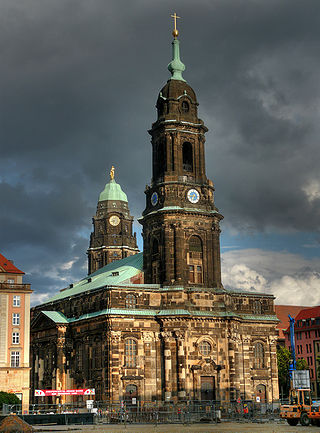Related Research Articles

The Dresden Kreuzkirche is a Lutheran church in Dresden, Germany. It is the main church and seat of the Landesbischof of the Evangelical-Lutheran Church of Saxony, and the largest church building in the Free State of Saxony. It also is home of the Dresdner Kreuzchor boys' choir.

The Dresdner Kreuzchor is the boys' choir of the Kreuzkirche in Dresden, Germany. It has a seven-century history and a world-wide reputation. Today, the choir has about 150 members between the ages of 9 and 19, from Dresden and the surrounding region. The boys attend the Kreuzschule in Dresden. They are also called "Kruzianer".

Roderich Kreile is a Lutheran church musician, choir director and university teacher. He had been the director of the Dresdner Kreuzchor at the Kreuzkirche, Dresden, as the 28th Kreuzkantor since the Reformation from 1997 until his retirement in 2022.
Jörg Herchet is a German composer.
Manuel Gervink is a German musicologist and scholar who has worked at the Universities of Cologne and Dresden.
Peter Ludwig Gülke is a German conductor and musicologist.
Albrecht Riethmüller is a German musicologist.
Hermann Danuser is a Swiss-German musicologist.
Wilfried Krätzschmar is a German composer.
Matthias Herrmann is a German musicologist and university professor.
Dieter Härtwig was a German dramaturge, musicologist and author of numerous writings on Dresden's music history and its personalities.
Michael Heinemann is a German musicologist and university professor.
Hans Schnoor was a German musicologist, journalist and music critic. In the late 1950s, he attracted media attention with his denunciation of Arnold Schönberg's A Survivor from Warsaw.
Thomas Reuter is a German composer, choral conductor, and a pianist focused on free improvisation.

Manfred Weiss was a German composer especially of symphonies, concertos and vocal music, based in Dresden. He taught composition and music theory at the Hochschule für Musik Carl Maria von Weber from 1959, as professor from 1983 to 1997, influencing generations of composers, and instrumental in the restructuring of the music department after the German reunification.
Fritz Reuter was a German musicologist, music educator, composer and Kapellmeister. Reuter was one of the most important German music educators of the 20th century. After studying music and musicology in Dresden and Leipzig, with Teichmüller, Riemann, Schering and Abert, he received his doctorate in 1922. In 1945, he was appointed Kapellmeister at the Volksoper in Dresden. In 1949, he was appointed as the first professor of music education at a German university. He was also director of institutes at the Martin Luther University of Halle-Wittenberg and the Humboldt University Berlin. In 1955, he was one of the initiators of the first Hallische Musiktage.
Richard Schmidt was a German cantor and organist.
Horst Förster was a German conductor, choirmaster, violinist and university teacher. In 1952, he was appointed the youngest General Music Director of the GDR in the Landestheater Eisenach. Afterwards, he was chief conductor of the Philharmonisches Staatsorchester Halle and the Singakademie Halle (1956–1964) as well as the Dresden Philharmonic (1964–1966), and of Belgrade Philharmonic Orchestra from 1985-1986.
Volker Rohde was a German conductor and academic teacher. After being principal conductor of the Orchester des Opernhauses Halle from 1976 to 1979, he subsequently served as deputy principal conductor at the Semper Oper Dresden and as musical director at the Oper Leipzig.
Friedbert Streller was a German musicologist and composer.
References
- ↑ Heinz Wegener: Bibliographie Fritz Reuter. In Ders. (Red. Bearb.): Gedenkschrift Fritz Reuter (Wissenschaftliche Zeitschrift der Humboldt-Universität zu Berlin. Gesellschafts- und sprachwissenschaftliche Reihe 15 (1966) 3). pp. I–VIII, here: p. VII.
- ↑ Dresden. "Carl Maria von Weber und die Frauen - Literarisch-musikalischer Abend am 20. September im Stadtarchiv Dresden". www.dresden.de. Retrieved 6 April 2020.
- ↑ Der Dresdner Kreuzkantor und Bach-Schüler Gottfried August Homilius : ein Beitrag zur Musikgeschichte Dresdens im 18. Jahrhundert on WorldCat
- ↑ Der Dresdner Kreuzchor und seine Kantoren on WorldCat
- ↑ Die Dresdner Oper im 19. Jahrhundert on WoerdCat
- ↑ "Moderation: "Alles hat seine Zeit" - Dokumentarfilm und Gespräch mit Kammersänger Peter Schreier am 20.10.2012 im Schloss Biesdorf". „Alles hat seine Zeit“ - Dokumentarfilm und Gespräch mit Kammersänger Peter Schreier am 20.10. im Schloss Biesdorf - Berlin.de. Retrieved 2018-10-14.